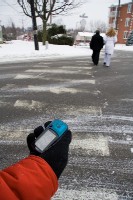 For one day every April treasure hunters put aside their competitive instincts and join together to mark International Cache in Trash Out day. Participants in the game of Geocaching join in a global effort to clean up parks, woods and beaches.
For one day every April treasure hunters put aside their competitive instincts and join together to mark International Cache in Trash Out day. Participants in the game of Geocaching join in a global effort to clean up parks, woods and beaches.
Geocaching is a relatively new game where the hunters use, not a faded map with X marking the spot to search for treasure, but a GPS or Global Positioning Receiver. Working in the same way as the Satellite Navigation Systems that are becoming popular with motorists, it is a hand held device that tracks satellites and uses them to mark your position within several metres. The location of the treasure, or cache as it is known, is published in newsgroups, on a Geocaching web site or even advertised locally between enthusiasts. Simply punch in the coordinates of the cache, and the hunt is on.
The game depends on the GPS device giving accurate position information, and so was not possible until May 2000 when the US administration removed Select Ability, a deliberate degradation of the GPS signal that had prevented it from being used effectively outside the military. Two days later, on the 3rd, a cache was hidden outside Portland, Oregon in the US. It was found on the 6th by Mike Teague who set up a web page to log the site and document others.
Read the rest of this entry »
 The Kentucky Derby is sometimes called the “Most exciting two minutes in sports”. That’s because it lasts just about two minutes. But what a two minutes it is! Here’s a bit of trivia to help you understand and enjoy “The run for the roses” even more:
The Kentucky Derby is sometimes called the “Most exciting two minutes in sports”. That’s because it lasts just about two minutes. But what a two minutes it is! Here’s a bit of trivia to help you understand and enjoy “The run for the roses” even more: Although there are many facts, trivia and stats for hockey, here are some interesting facts about the rink, ice and puck that are essential for a great game!
Although there are many facts, trivia and stats for hockey, here are some interesting facts about the rink, ice and puck that are essential for a great game! 1) What is the Super Bowl?
1) What is the Super Bowl? For one day every April treasure hunters put aside their competitive instincts and join together to mark International Cache in Trash Out day. Participants in the game of Geocaching join in a global effort to clean up parks, woods and beaches.
For one day every April treasure hunters put aside their competitive instincts and join together to mark International Cache in Trash Out day. Participants in the game of Geocaching join in a global effort to clean up parks, woods and beaches. Sure you watch “Monday Night Football” and cheer on your high school and college teams, but how much do you really know about football? Use these football facts to amaze your friends next Sunday and Monday.
Sure you watch “Monday Night Football” and cheer on your high school and college teams, but how much do you really know about football? Use these football facts to amaze your friends next Sunday and Monday. Checkered Flag – Signals the end of the session or race.
Checkered Flag – Signals the end of the session or race. * Women have been showing their athletic ability on ice for over 4000 years.
* Women have been showing their athletic ability on ice for over 4000 years.